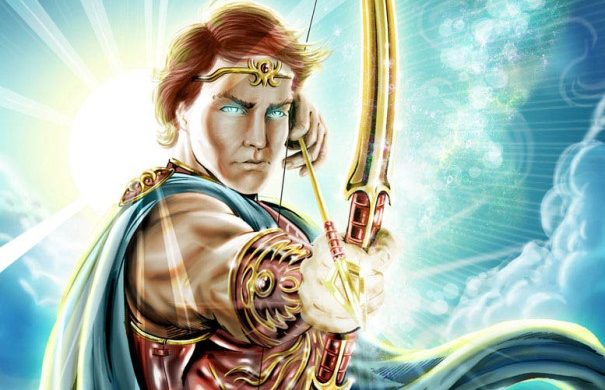
Apollo (Attic, Ionic, and Homeric Greek: Ἀπόλλων, Apollōn (GEN Ἀπόλλωνος); Latin: Apollō) is one of the most important and complex of the Olympian deities in classical Greek and Roman religion and Greek and Roman mythology. The national divinity of the Greeks, Apollo has been variously recognized as a god of music, truth and prophecy, healing, the sun and light, plague, poetry, and more. Apollo is the son of Zeus and Leto, and has a twin sister, the chaste huntress Artemis. Seen as the most beautiful god and the ideal of the kouros (a beardless, athletic youth), Apollo is considered to be the most Greek of all gods. Apollo is known in Greek-influenced Etruscan mythology as Apulu.[1]
As the patron of Delphi (Pythian Apollo), Apollo was an oracular god—the prophetic deity of the Delphic Oracle.
Medicine and healing are associated with Apollo, whether through the god himself or mediated through his son Asclepius, yet Apollo was also seen as a god who could bring ill-health and deadly plague.
Apollo is the god of archery and the invention of archery is credited to him and his sister Artemis. He had a golden bow (silver bow, sometimes) and a quiver of golden arrows. He is said to have never missed his aim, and his arrows could inflict harm by causing sudden deaths or deadly plague.
As the leader of the Muses (Apollon Musegetes) and director of their choir, Apollo functions as the patron god of music, dance and poetry. He is the inventor of string-music. The Cithara and the lyre are also said to be his inventions. The lyre is a common attribute of Apollo. Hymns sung to Apollo were called paeans.
Apollo favors and delights in the foundation of towns and the establishment of civil constitution. Hence is associated with dominion over colonists. Additionally, he is the god of foreigners, the protector of fugitives and refugees. Apollo is the giver and interpreter of laws. He presides over the divine law and custom along with Zeus, Demeter and Themis.
As the protector of young, Apollo (kourotrophos) is concerned with the health of children. He presides over their education and brings them out of their adolescence. Boys in Ancient Greece, upon reaching their adulthood, cut their hair and dedicated it to Apollo.
Apollo is the patron of herdsmen and protector of herds and flocks. He is causes abundance in the milk produced by cattle, and is also connected with their fertility. As an agricultural deity, Apollo protects the crops from diseases, especially the rust in corns and grains. He is also the controller and destroyer of pests that infect plants and plant harvests.
Apollo is the god who affords help and wards off evil. He delivered men from the epidemics. Various epithets call him the “averter of evil”.
In Hellenistic times, especially during the 5th century BCE, as Apollo Helios he became identified among Greeks with Helios, Titan god of the sun.[2] In Latin texts, however, there was no conflation of Apollo with Sol among the classical Latin poets until 1st century AD.[3]Apollo and Helios/Sol remained separate beings in literary and mythological texts until the 5th century CE.